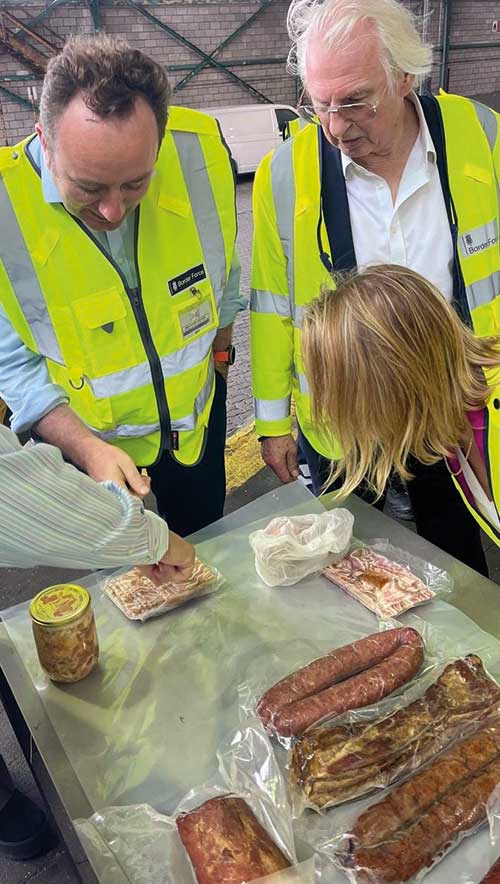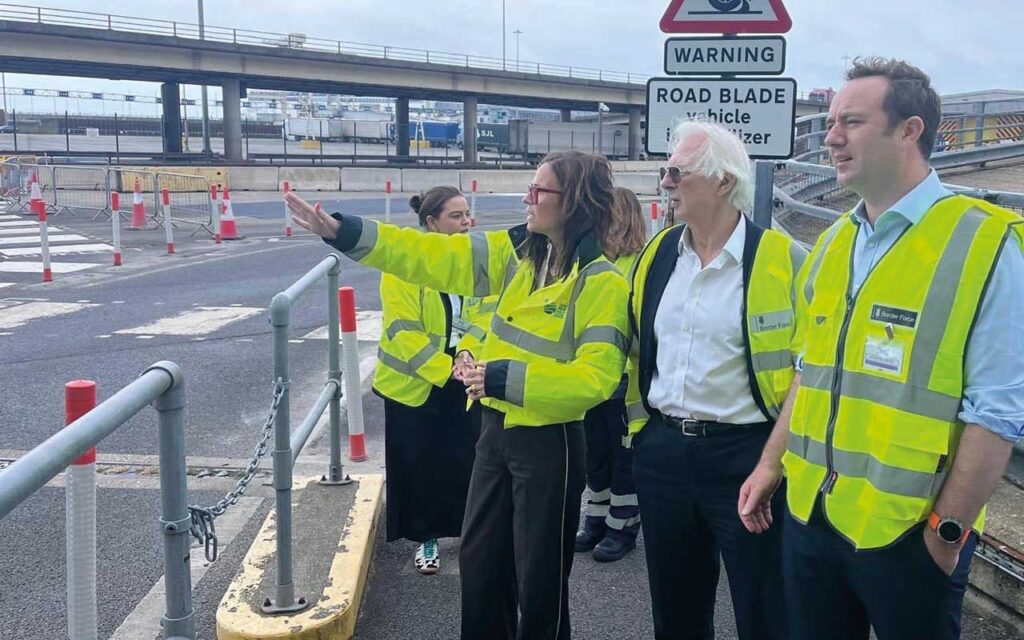Parliamentarians have expressed shock at the state of the facilities at the Port of Dover and the lack of resources available to support the teams tackling illegal meat imports there.
Members of the All-Party Parliamentary Group (APPG) on UK Food Security visited the port in July and met with officials from Border Force and Dover Port Health Authority (DPHA).
During the visit, which was organised by the NPA, Liberal Democrat MPs Helen Morgan and Danny Chambers and crossbench peer Lord Trees witnessed at first hand the extremely difficult work taking place to protect the country from diseases like African swine fever (ASF) and foot-and-mouth disease (FMD).
Lucy Manzano, DPHA’s head of port health and public protection, showed them both the tourist and freight lanes, where they witnessed the procedures the teams undertake to seize illegally imported meat.
The APPG members saw various examples of where products of animal origin (POAO) had been brought into the UK illegally – not just through the personal import route, but also smuggled into commercial loads, NPA public affairs manager Tom Haynes said.
“Some of the commercial loads had this illegal POAO well hidden among legitimate consignments and were due to clear customs unchecked owing to flaws in the post-Brexit commercial imports system, the Border Target Operating Mechanism [BTOM],” he said. “Had DPHA not undertaken random spot checks on these vehicles, this illegal POAO would have entered the country.”

Front line
Dover is on the front line of this work as the UK’s biggest entry point. Since October 2022, DPHA has seized more than 243t of illegally imported product under rules introduced to protect the UK from ASF – despite limited funding and only a small percentage of vehicles being checked.
“It looks as though this year’s figure will, just over halfway through 2025, very shortly overtake the total seizure for the whole of 2024,” Mr Haynes said.
Despite the vital nature of the work it carries out, DPHA has been involved in a protracted dispute with Defra over funding for it.
After concerns the funding was going to be cut altogether, earlier this year Defra offered DPHA £3.1m for 2025-26 to deliver ‘pro-active illegal meat controls’ at Dover and Coquelles, the Channel Tunnel entry point, in France.
However, Ms Manzano recently told the Environment, Food and Rural Affairs Committee, as part of its inquiry into national biosecurity, that the funding enables less than 0.2% of vehicles arriving via Dover to be checked, with no proactive checks at all taking place 80% of the time. It also allows no provision for checks at Coquelles, while no funding commitment has been indicated after March 2026.
“This figure is not sufficient, nor are the stipulations made by Defra, that vets and the system used to record our seizures will no longer be paid for,” Ms Manzano said.
‘Shocked by what we saw’
Lord Trees said it was fair to say all three parliamentarians were ‘shocked by what we saw’.
“DPHA, aided by Border Force, are doing all they can to check incoming vehicles for illegal imports of POAO. Faced with some 7,000 vehicles a day, offloaded at great speed – a ferry typically unloads all vehicles within seven minutes – with the resources they have, they face an impossible task.
“They only have enough staff to even potentially randomly check 20% of all the vehicles unloaded.
“In spite of the very few vehicles they do stop and check, the amount of meat and other animal products they have found and impounded has risen from a fraction of a tonne in the month of January 2023 to over 24t in January this year.
“This is but a tiny peak of an iceberg. The nature of these imports – for example, products from pigs or even wild boar – is such that they pose a huge biosecurity threat to the UK for both FMD and ASF.”
“The inspectorate at Dover is funded by DPHA, with an additional grant from Defra, which is due to expire in 2026. Basically, the DPHA is providing the biosecurity for the UK, given the pre-eminence of Dover as a port for incoming freight.
“There is a newly built border control post very close to Dover Port, at Bastion Point, some 3.2 miles away, which remains unused – this is mystifying. As it is, the facilities for inspection at the Port of Dover are in poor condition, inadequate and inappropriate for inspection of vehicles that may be carrying illegal and possibly infected meat products.”
Sleepwalking into a repeat of 2001
Mr Chambers, the MP for Winchester, said he was also ‘really shocked’ by what he and his fellow APPG members witnessed at the Port of Dover.
“Despite commendable efforts from all the DPHA and Border Force staff present, we were all really taken aback by the state of the facilities and the resources available to stop potentially disease-infected animal products entering the UK illegally.
“As a vet, the issue of biosecurity and disease is something I have repeatedly raised in parliament. Having now seen the operation at Dover, and despite repeated assurances from ministers, I fear we are sleepwalking into a repeat of 2001.
“The cost of diseases like ASF and FMD far outweigh the investment required to help protect the UK and we should be learning the lessons from other island nations like Australia and New Zealand.
“The government should implement strict biosecurity controls at our borders and provide adequate resources to agencies like DPHA and Border Force.”
Robust defences
Mr Haynes added: “Much of the produce being seized at Dover has already entered from outside the EU and then travelled the whole way across the EU before landing at UK ports.
“The recently agreed deal, and future sanitary and phytosanitary agreement with the EU is a welcome first step and will negate the need for much of the flawed BTOM implementation.
“However, it is unlikely to come into force for a number of years and does not reduce the risk posed by illegally imported POAO, especially from malign actors.
“As we transition to this new system, having robust biosecurity defences at the border must be a priority. We can’t simply rely on the EU to do this work for us.”
Following the visit, the APPG has written to Defra highlighting its concerns and calling on the department to ensure the vital work at Dover is sufficiently resourced.
Defra minister’s stance
Asked recently by MPs on the EFRA Committee about the funding offer to DPHA, Defra biosecurity minister Baroness Hayman said the department had tried to ‘pin DPHA down on what we actually need to be resourcing’.
Asked if 20% coverage at Dover was sufficient, she replied: “We would suggest that if the budget was purposed in the way we are proposing, it would be more than 20%.
“We need to focus on picking up the illegal meat, for example. A couple of times, we have asked them to refocus the budget,” she said, highlighting a dispute over whether official veterinarians (OVs) were needed at the port.
“We are currently looking at what the focus of that funding should be because we believe that some of the areas that Dover has proposed comes out of that money are not necessary – for example, veterinary fees.”
However, Ms Manzano said: “The OV skill set is unreplicated within the team, and they are critical to the successful delivery of this highly challenging and unique area of work, which includes complex identification processes of POAO and animal by-products.”




